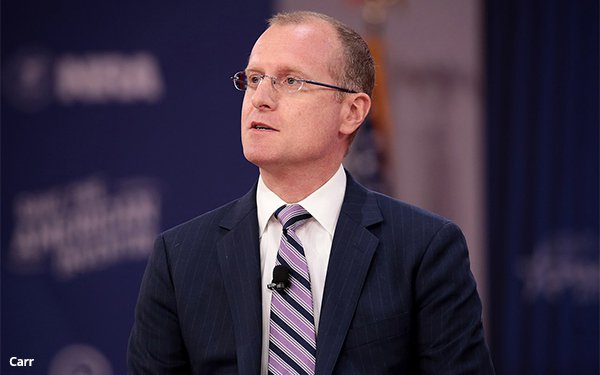
Federal Communications Commission Chair Brendan Carr is
asking Google to address allegations that YouTube TV “marginalizes” faith-based programming.
“I am writing because concerns have been raised with the FCC that YouTube TV
discriminates against faith-based programming,” Carr said Friday in a letter sent to Alphabet CEO Sundar Pichai and YouTube CEO Neal Mohan.
The FCC chair, who has loudly criticized large tech companies over their editorial policies, posted on X, formerly Twitter, that the allegations against Google “come at a time when American public discourse has
experienced an unprecedented -- and unacceptable -- surge in censorship.”
advertisement
advertisement
Carr is asking the company to brief staff on the role of virtual multichannel video programming distributors and
YouTube's carriage negotiations procedures, “including the potential role of viewpoint-based discrimination.”
The FCC head pointed specifically to the company Great American Media,
which he said claimed in a letter to him that YouTube TV “deliberately marginalizes faith-based and family-friendly content.”
“Great American Media states that its Great
American Family network is the second fastest-growing channel in cable television and, while they are carried on a range of cable and streaming services, including Comcast, Cox, Hulu, FuboTV, and
DirecTV stream, YouTube TV refuses to carry them,” Carr wrote.
A YouTube spokesperson said, “We welcome the opportunity to brief the FCC on YouTube TV’s subscription service
and the strategic business decisions we make based on factors like user demand, operational cost and financial terms, and to reiterate that we do not have any policies that prohibit religious
content.”
Despite Carr's public questioning of YouTube TV, the FCC lacks authority to require the company to carry particular programming.
The FCC doesn't currently
regulate virtual multichannel video programming distributors, and even if the agency did regulate such companies, they would have a First Amendment right to decide what to carry based on viewpoint --
the same way that cable operators can choose what to carry -- according to Harold Feld, an expert in telecom law and senior vice president at the advocacy group Public Knowledge.
“Cable
operators have a First Amendment right to decide 'I don't want to carry this guy,' based on content,” he tells MediaPost.
Carr says in his letter to Google that Section 616 of
the Communications Act authorizes the FCC to “address certain discriminatory practices” in negotiations for carriage agreements between traditional cable operators and vendors, and
suggests that this provision could in the future be extended to virtual distributors like YouTube TV.
But that provision of the law only restricts anticompetitive actions, such as a cable
operator's refusal to carry an independent channel that competes with one of the cable provider's own affiliates, Feld says.
In other words, even if Section 616 covered YouTube TV, that
provision would not affect the company's ability to decide what types of content to include in its lineup, according to Feld.
Carr, an author of the conservative Heritage Foundation's Project 2025, has previously argued that large tech companies like YouTube and Facebook -- and not the cable and
telecom companies that offer internet access -- are the “real abusers of gatekeeper power.”
In November, he said in a letter to the CEOs of Google, Meta, Apple and Microsoft that
their companies had “played significant roles” in what he described as an “unprecedented surge in censorship.”
He went on to accuse the companies of participating in a
“censorship cartel” that included advertising and fact-checking organizations. (Carr didn't name any advertising groups, but his accusations seemed reminiscent of ones made by the Republican-led House Judiciary Committee
against the World Federation of Advertisers' now-shuttered Global Alliance for Responsible Media.)
That letter alarmed some observers, who said the FCC would be the one engaging in censorship
if it attempted to control tech companies' content moderation policies.
“Far from defending the First Amendment, this is what censorship looks like: a regulator implicitly threatening
private companies for their speech,” Senator Ed Markey (D-Massachusetts) said last November in a post on X. “The FCC under
Trump is prepared to become the Federal Censorship Commission. We can't let that happen.”